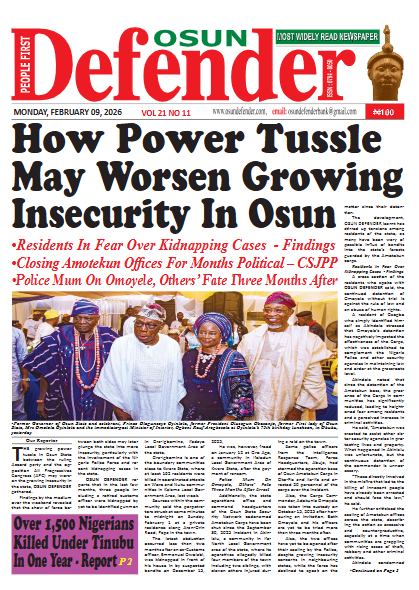THE primary responsibility of government that is in direct control of the state (the armed forces, police, and intelligence agencies) is the security of lives and property of all its citizens. The best way to approach that responsibility is to guarantee the rule of law (equality before the law) and the welfare and prosperity of the citizens. Once the government fails consistently to end (or reduce to the barest minimum) the problems of mass poverty, ignorance, nepotism and selective dispensation of justice, it has become the main agent of insecurity itself!
Having reconciled to our fate in the interim with a political elite largely uncommitted to ending but even sworn to deepening illiteracy, ignorance, poverty, sectionalism and impunity, we can expect only the least commitment from any section of them in power towards playing by the rules when it comes to elite rivalry in electoral (do-or-die) contests for democratic power; especially when their true and only manifesto is control of “free money” from the federation allocation accounts for wilful spending, while deceiving the masses with bogus promises.
The National Bureau of Statistics has it that about 53% of youths between the ages of 15 and 34 are unemployed. Those not out-of-school are on forced holidays along with their tertiary institution teachers. Between indolence and active engagement in fraud, scams, robbery, kidnapping, and as agents of terrorist attacks, a large army of both idle and criminally disposed youth, created by the failures of the political elites, come in handy as thugs and tools of political violence against perceived opposition in their journey to power to control allocations from the federation’s accounts for selfish disbursement.
In Osun, the reality of insecurity and political violence, across board – both ruling and opposition parties – have been on ground months since, and escalating as the July 16, 2022 governorship elections date approaches. There are two most worrisome aspects of this condemnable tendency capable of jeopardising the election and denting its credibility.
Firstly, the deployment of the Regional Security Outfit, Amotekun, for political expediency is most unfortunate. It goes against the law and the calling of the outfit: basically setup to tackle the increasing menace of terror and associated violent crimes like kidnapping. The government must resist every temptation to draft them into partisan political engagement as vicious tools of political vendetta. That would be another powerful argument against state policing, which is already overdue but comes up against the genuine argument of possible executive abuse. During election, whatever role Amotekun is to play, if any at all, has to be under strict supervision of the police force and at no time must they operate independent of police control.
Secondly, flowing from above, even the police that must exercise supervisory role over Amotekun and other sister security agencies have become systematically partisan over the last years, in Osun especially. There have been protests and calls in the public space for the removal of the Osun Police Commissioner over poor managerial capacity and partisan compromise. It does not augur well for a major security outfit that should oversee the proceedings without fear or favour to ally with one of the parties, for pecuniary interests obtainable by its chief officers.
In the final analysis, the resolve and determination of the citizens to have their say and have their way in who governs them will be decisive. It is not the first time politicians will try to compromise the state and exploit violence, fear and insecurity as electoral weapons; it has always been the resolve of the people to assert themselves and ensure their votes count that makes the difference, even as cross-sections of the Civil Societies are as compromised as the partisan security outfits.










